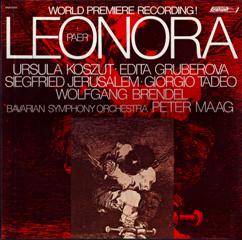Ferdinando Paër - Leonora (1978)
Ferdinando Paër - Leonora (1978)

Disc One: 1. Overture, Act I 2. Fedele, mio diletto 3. Ah venga quell momento 4. Mia cara, cara, cara 5. Per me è facilissima 6. Che vuol dire 7. recit: Orsu, finiscila 8. Oh, cielo! 9. recit: Mio povere Fedele 10. Quai pensieri 11. Esecrabil Pizzarro 12. I tuoi gemiti 13. Fiero aquilon furente 14. recit: Signora Marcellina 15. Corri, corri da qualche astrologo 16. Nè traccia d’esistenza 17. Signor mio, son sessant anni 18. Vi trovo a tempo, mio genitore 19. Ola! non piu rumori Disc Two: 1. Introduction, Act II 2. Ciel! Che profonda oscurita 3. Dolce oggetto del mio amore 4. Oh Giustizia 5. Da bravo, via lesto! 6. Deh, per piatade 7. Che l’eterna providenza 8. Fermate! Io lo difendo! 9. Ah! Qual suon, qual nouvo affano 10. Leonora! 11. Volontieri, volontieri 12. Dolce sposo! Tenero amico mio 13. Signor, eccoli la! 14. Voi donna impareggiabile 15. Ragazza bella 16. Di virtude il bel sentiero Leonora - Urszula Koszut Marcellina - Edita Gruberova Florestano - Siegfried Jerusalem Don Pizarro - Norbert Orth Don Fernando - John van Kesteren Giacchino - Wolfgang Brendel Rocco - Giorgio Tadeo Symphonie-Orchester des Bayerischen Rundfunks Peter Maag – conductor
Ferdinando Paer, the Parma-born music director at the Kärntnertortheater in Vienna and a regular performer in Marie Therese’s private concerts, moved to another court in Dresden while Austria was at war with Napoleon. It was in Dresden that Paer finished his Leonora for the Empress in 1804. The overture and first act of Paer’s Leonora are the musical basis for A Roadkill Opera. After Napoleon defeated the Austrians, Paer moved to Paris where he eventually headed up the Opéra-Italien, to be succeeded by Rossini. When Paer died in 1839, his Leonora was forgotten. Forgotten, that is, until another musical denizen, intrigued by Beethoven’s high praise for Paer’s music, recovered Paer’s Leonora. Peter Maag was a renowned Swiss conductor who, among other things, took two years off from conducting to meditate in a Buddhist monastery. At one point he was the artistic director at the Vienna Volksoper. When he found Paer’s Leonora, Maag was artistic director of the Teatro Regio di Parma in Paer’s home town. Maag was so taken with it that he mounted a radio production in 1976 and followed up with a 3-disc boxed set on London Records in 1978. After 140 years of neglect, Paer’s Leonora was back. ---Stephan Alexander Parker, amazon.com
In 1803, Ferdinando Paër began work on his version of Bouilly’s drama, with an Italian translation by Giovanni Schmidt titled Leonora ossia l’Amor Coniugale. A prolific composer who wrote 55 operas, Paër had served as music director at Vienna’s Kärtnertheater, a post he held until 1801, before being appointed the following year as composer at the court theater in Dresden. In 1804, the Elector appointed him to a lifetime position as Hofkapellmeister (conductor of the court orchestra). It was in this year, at this theater, that his Leonora was premiered. Perhaps this opera was written as a tribute to a beloved spouse, since the soprano singing the title role was Francesca Riccardi-Paër, the composer’s wife.
Of the three operas beside Fidelio that used a version of Bouilly’s text as the libretto, Leonora has been the most popular – “popular,” of course, being a relative term. It still ranks as a rarity, but has been performed several times in the late 20th and early 21st centuries. It was championed by the Swiss conductor Peter Maag in the 1970s, who first led a performance at Schwetzingen in 1976 that was recorded live by the small MRF label. This recording is no longer available; however, the studio version released by Decca two years later can still be obtained from Amazon – assuming one has a turntable upon which to play the LPs, since Decca never issued this recording on CD. The cast is noteworthy for featuring some well-known singers at the beginning of their careers: Siegfried Jerusalem as Florestano, Edita Gruberova as Marcellina, Norbert Orth as Pizzarro (the spelling used in Paër’s opera), and Wolfgang Brendel as Giacchino. The title role is sung by Urszula Koszut, and while her lyric soprano has an attractive quality, it’s really a little underpowered for the demands of Paër’s writing.
In his introduction to the opera that is included with the libretto that accompanied the Decca recording, Maag noted that it was Beethoven’s own enthusiastic comments about Paër that prompted him to track down information on the Italian composer and his operas. Beethoven and Paër were acquaintances, and Maag found in the latter’s score “an almost disturbing resemblance” to Fidelio, adding, “I am absolutely convinced that Beethoven knew Paër’s work well.” Maag’s observation is echoed by Jonas Kaufmann in a Feb., 2008, interview he gave to “Klassikakzent.” Asked about composers or works that he believed to be currently overrated or underappreciated, the tenor responded, “Ferdinando Paër. He wrote the original Leonore long before Ludwig von Beethoven, who appropriated some of it.” ---MAuer, operalively.com
download (mp3 @320 kbs):
yandex 4shared mega mediafire uloz.to cloudmailru uptobox ge.tt








